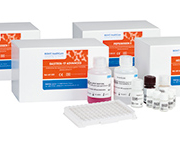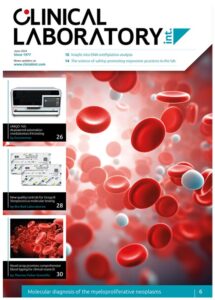A blood test for checking stomach health
Helicobacter pylori (Hp) -infection and atrophic gastritis (AG) are the most important risk conditions preceding gastric cancer (GC). Following extensive research and development, a Finnish biotechnology company, Biohit Oyj, has launched the GastroPanel test, a panel of four stomach-specific biomarkers that give accurate information on both the structure and function of gastric mucosa.
by Dr Kari Syrjänen
Since the risk of GC and peptic ulcer disease among individuals with healthy stomach is very low, it is essential to distinguish between subjects with healthy stomach and those with gastric disorders. With GastroPanel – a simple blood test – it is now possible to detect the patients who are at high risk for GC because they harbour either Hp -infection, AG or both in their stomach mucosa. Hp -infection alone increases the risk of GC several-fold, and this risk is over 90-fold among patients with Hp -related severe AG of both the corpus and antrum (pangastritis)[1, 3].
Another area of use for the GP test are the dyspeptic complaints, which in western countries appear in 20-40% of the population. According to most current medical practices, the assessment of these complaints should invariably include a gastroscopic examination for which the existing resources are clearly insufficient and which is actually not really necessary. The same applies to the costly and risky “test” medications with proton-pump inhibitors (PPIs), since it is now possible to screen the patients at true risk and for whom gastroscopy is indicated by using the GastroPanel test. With this approach, approximately 40-70% of the limited and expensive endoscopy capacity can be released for colonoscopies, i.e. for screening and early detection of colorectal cancer. Because of the fact that, particularly among the elderly, dyspeptic complaints are frequently of large intestinal origin, it is cost-effective to supplement the examinations of these dyspeptic patients with colorectal screening methods like the ColonView test, a stool based detection of Hb and Hb/Hp complex, or colonoscopy.
The safe and cost-effective GastroPanel test enables early detection of many different disorders, and thus helps avoiding the majority of subsequent health problems. Besides gastric and esophageal cancer, undetected AG of the corpus (acid-free stomach) can eventually also lead to malabsorption of vitamin B12, iron, magnesium, calcium, and some drugs. AG of the antrum, in turn, increases the risk of peptic ulcer disease and GC.
Concomitant AG of the antrum and corpus (pangastritis) is the single most important risk condition for GC. A minority of GCs can develop directly from HP-induced gastritis, without recognizable stages of mucosal atrophy. It is well known that vitamin B12 deficiency can lead to pernicious anemia (PA), dementia, depression, and injuries of the peripheral nervous system. Calcium deficiency, in turn, leads to osteoporosis. The absorption of many drugs is impaired in acid-free stomach. The risk of serious intestinal infections (giardiasis, malaria, Clostridium difficile and E. coli EHEC) can be increased particularly among senior citizens with AG.
Within public healthcare, it is possible to achieve substantial cost savings by replacing the systematic use of gastroscopy with a simple and inexpensive first-line diagnostic tool like the GastroPanel test for all patients with dyspeptic symptoms.
References
1. Suovaniemi O. GastroPanel-tutkimus osaksi dyspepsian hoitokäytäntöä. Yleislääkäri 2007; 4:104-106.
2. Malfertheiner P, Mégraud F, O’Morain C ym. Current concepts in the management of Helicobacter pylori infection: the Maastricht III Consensus Report. Gut 2007; 56:772-781.
3. Agreus L, Kuipers EJ, Kupcinskas L, Malfertheiner P, Di Mario F, Leja M, Mahachai V, Yaron N, van Oijen M, Perez Perez G, Rugge M, Ronkainen J, Salaspuro M, Sipponen P, Sugano K, Sung J. Rationale in diagnosis and screening of atrophic gastritis with stomach-specific plasma biomarkers. Scand J Gastroenterol 2012; 47:136-147.
The authors
Prof Kari Syrjänen,* MD, PhD, FIAC,
Chief Medical Director, Biohit Oyj.
Lea Paloheimo PhD
Director of Business Development and Quality, EurClinChem,
*Corresponding author
E-mail: kari.syrjanen@biohit.fi



